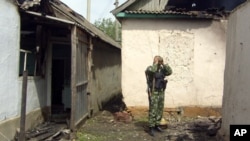In Moscow’s struggle against its southern Islamic insurgency, Russian officials see the death of Osama bin Laden as a psychological victory.
From President Dmitry Medvedev on down, Russian officials have warmly hailed the successful American effort to track and kill Osama bin Laden.
Russia’s foreign ministry, hardly known for its pro-American statements, issued a congratulatory note, saying: "as members of the anti-terrorism coalition, we share the Americans’ feelings."
Combating Islamic terrorism constitutes a rare point of common ground for the old Cold War rivals.
Last year, Russia lost as many security officials in its Muslim majority North Caucasus as the United States lost soldiers in Afghanistan. Last year, 440 Russian police and soldiers were killed in the Caucasus - roughly the same number as American troops killed by hostile action in 2010 in Afghanistan. In both countries, about 10 security officials were wounded for each one killed.
But in both battlegrounds, Osama bin Laden’s influence seems to have recently been far more inspirational than operational.
Alexander Cherkasov, Caucasus expert for the Memorial Human rights group, says that Osama bin Laden was a powerful symbol for Russia’s radicalized Muslims.
He said the financing for the rebels now is largely generated locally, through extortion rackets.
Pavel Baev, Caucasus expert for the International Peace Research Institute in Oslo, Norway, agrees, saying that the rebel groups in the four Islamic majority regions of Russia’s Caucasus no longer live off donations from Saudi Arabia. Instead, they feed off the massive aid transfers from Moscow to the region. "Structure of funding is very certainly linked to Moscow, and not to any other sources of external funding. So Al Qaeda has a symbolic role, maybe, as creator of ideals and discourse, but hardly anything greater than that," Baev said.
Historically, there are links. Osama bin Laden acquired his guerrilla skills fighting against Soviet soldiers in Afghanistan. Until his death on Monday, he often posed with a Kalashnikov rifle that he said he seized from a Russian soldier he had killed in the 1980s.
In late 1996, after Russian soldiers withdrew from Chechnya, Ayman al Zawahiri, then al Qaeda’s number two, traveled to Chechnya, looking for a new home for the movement.
On leaving Chechnya, he was jailed for several months in the neighboring Russian republic of Dagestan. After that experience, al Zawahiri decided it would be safer to move al Qaida to Afghanistan.
Three years later, when Russian soldiers moved to reassert control over Chechnya, hundreds, possibly thousands, of Arab mujahedin traveled to Chechnya to fight against the Russians.
But Andrei Soldatov, a Russian security analyst, said most of the foreign fighters did not depend on bin Laden and his Saudi financing. And bin Laden had shifted his target - from Russians to Americans.
"To be frank, al Qaida was never very significant for the North Caucasus. And al Qaida itself never considered Chechnya as a front against for example American or British targets," Soldatov said.
But, to gain a wider international prominence, several insurgent units in the Russian Caucasus claim loose affiliation with al Qaida. And every year, a few Arab fighters are killed in the Russian mountains.
Two weeks ago, Ramzan Kadyrov, head of Chechnya, announced that his soldiers had killed "the chief representative of al-Qaida in the North Caucasus," Khaled Yusef Muhammed, a Saudi national.
Self-styled as Commander of the Arab Mujahideen in Chechnya, Muhammed was sharing a camp with one bodyguard when he was killed. Kadyrov said he was sold out by a comrade for bounty.
Kadryov and other regional officials say that bin Ladin’s death removes a charismatic symbol for the radical Islamic movement.
Baev, the analyst, agrees. "So the death of bin Laden is merely of abstract importance," Baev said.
But with operations controlled and financed inside Russia, the Islamic insurgents remain powerful forces who may want to respond to the death of their hero.
Russians are bracing for more violence. Security is being tightened for the annual Red Square military parade, which will take place on Monday to mark the anniversary of the Soviet victory over Nazi Germany.
Looking ahead, Alexander Bortnikov, director of the FSB, the successor agency to the KGB, warns that terrorists plan to target the 2014 Winter Olympics in Sochi, a normally peaceful resort city - on the western end of the Caucasus mountain chain.
Fighting Islamic Terrorism Seen as Common Ground for US, Russia
- By James Brooke




